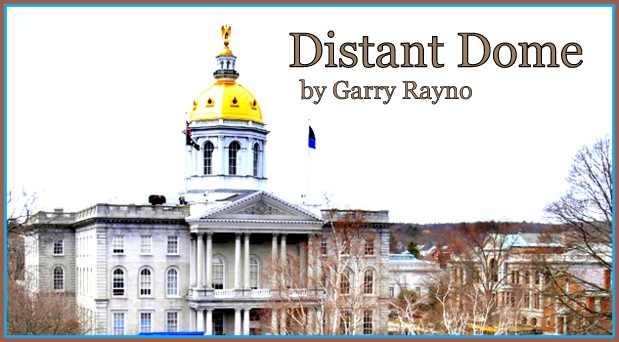InDepthNH.org co-publishes Garry Rayno’s Distant Dome partnering with Manchester InkLink
By GARRY RAYNO
New Hampshire lawmakers always said “we are different, we’re not like Washington,” but these days the New Hampshire Legislature looks more and more like Congress.
Two decades ago, there was a difference as Republicans and Democrats worked together for the good of the state to address Public Service’s bankruptcy, the Supreme Court’s Claremont education decision and a reeling economy in the late 80s and early 90s.

Garry Rayno
And to be fair, over the last few years, both parties worked together to expand Medicaid to the working poor and to fight the opioid addiction crisis, but far too often Republicans won’t even capitalize the D at the beginning of Democrat much less say Democratic, while Democratic lawmakers see no need to seek GOP sponsors for their legislation, because it really is just a political statement for the next election.
In Washington last week, after seven years of trying to repeal the Affordable Care Act, Republicans failed to garner enough votes to do away with current law and replace it with a plan that a majority of Americans found unacceptable because it would have meant 24 million fewer people with health insurance and skyrocketing costs for older Americans.
In the process, President Donald Trump and House Speaker Paul Ryan managed to empower about three dozen far-right House conservatives who believe they will now set the agenda for the remainder of the current two-year term.
To pass the package, Trump and Ryan turned to the US House Freedom Caucus to find the votes needed to pass their plan. The 30 to 35 caucus members — the most conservative House members — vote as a block and need a more than supermajority to support any piece of legislation.
The caucus vehemently opposed the plan.
Trump and Ryan proposed changes to sway the caucus but that caused a growing number of centrist Republicans to oppose it and the speaker Ryan had to pull the bill facing certain defeat.
 The move to the right also would have doomed the bill in the Senate and creates a dicy situation for other key components of Trump’s and the Republicans’ agenda going forward.
The move to the right also would have doomed the bill in the Senate and creates a dicy situation for other key components of Trump’s and the Republicans’ agenda going forward.
A few arch conservatives in the US House now believe they control the Republican agenda in Washington and Trump or Ryan both attacked the caucus for undermining the GOP agenda which is finally within reach after eight years.

Wikipedia
President Donald Trump
A similar situation is happening in New Hampshire with the state’s two-year budget package scheduled for a House vote next week.
The House Finance Committee had barely approved its $11.9 billion proposal on a 16-9 vote when the NH House Freedom Caucus released a statement to the press saying it would not support the plan.
“What we are seeing is massive growth of government just because the revenues will be higher,” said caucus member Rep. Len Turcotte, R-Barrington. “Our government would better serve our businesses and taxpayers by easing the tax burden on them, instead of going on a shopping spree.”

Rep. Len Turcotte, R-Barrington
What could be wrong with a budget that does not increase taxes or fees or create new taxes or fees, a Republican’s ideal for some time?
The budget the first Republican Governor in 12 years — Chris Sununu — proposed spent $12.2 billion, which the House Finance Committee trimmed by roughly $300 million, but that is not nearly enough for the most conservative House members and organizations.
The Coalition of NH Taxpayers said in a press release the budget proposal was more than $700 million higher than the current two-year plan.
The coalition’s chairman Ed Naile accused House budget writers of making phony cuts to programs that have to be funded by federal law with federal money.
“Having spent years fighting massive increases in spending, I’m shocked and outraged,” he said, “that I can’t even turn my attention away for a minute to work on voter fraud, without the same tax and spend politicians taking over the State House and spending us into oblivion.”
However, the question in the State House always is “Have you got the votes?” Are there enough members of the Freedom Caucus and otherwise disgruntled GOP representatives to kill the budget package, House Bill 1 and House Bill 2?
With a 222-174 partisan split, the House Republican leadership does not have a lot of padding to cushion a fall with little or no support from House Democrats, meaning a couple dozen Republicans can sink the budget.
Even some members of the House Finance Committee expressed doubts House Speaker Shawn Jasper’s team has the vote to pass the current plan.
Jasper was in the same situation two years ago when the House voted on the current budget package.

House Speaker Shawn Jasper
If you are Jasper there are several options: You can roll the dice hoping to cobble together enough votes to squeak through, have amendments ready to make significant cuts to bring the Freedom caucus on board or offer yet more amendments to entice enough Democrats to support the package?
Two years ago, Jasper turned to the conservatives to pass the budget, and is likely to do the same again although Democrats probably could be persuaded with an additional $50 million to $75 million instead of making several hundred million dollars in cuts needed to bring conservatives on board.
Despite all the hand-wringing being done now through the weekend on the State House’s third floor, it is good to remember passing the House’s version of the budget is but one step in the process.
Once the Senate begins work on the two-year spending plan budget writers will have more refined revenue estimates. Businesses pay a large portion of their tax liability as do individuals owing interest and dividends tax in March and April giving Senate Finance and Ways and Means committee members a clearer revenue picture for the coming two years.
If business taxes continue to be as strong as they have been, the Senate will have tens of millions of dollars in additional money to work with, but there is a different atmosphere this year.
Although the number of Senate Republicans has remained the same, each of the last two elections has made the caucus more conservative so the Senate may not be the savior it has been for social service and public education advocates.
Budgets and issues like the Affordable Care Act have a way of highlighting the divisions in the Republican Party that make governing difficult even when you control both houses and the executive branch here and in Washington.
The question for the GOP house, senate and executive branch leaders is whether a small group of the most conservative members will control the party’s agenda in New Hampshire and in Washington when it is not the will of a majority of the country or New Hampshire.
If that small group controls the agenda, the next election could be very interesting indeed.
Garry Rayno can be reached at garry.rayno@yahoo.com.
Garry Rayno’s Distant Dome runs exclusively on Manchester Ink Link and InDepthNH.org, where Rayno will explore a broader perspective on State House – and state – happenings. Over his three-decade career Rayno has closely covered the NH State House for the New Hampshire Union Leader and Foster’s Daily Democrat, and his coverage spanned the news spectrum, from local planning, school and select boards, to national issues such as electric industry deregulation and Presidential primaries. He is former editor of The Hillsboro Messenger and Assistant Editor of The Argus-Champion. Rayno graduated from the University of New Hampshire with a BA in English Literature and lives with his wife Carolyn in New London.





